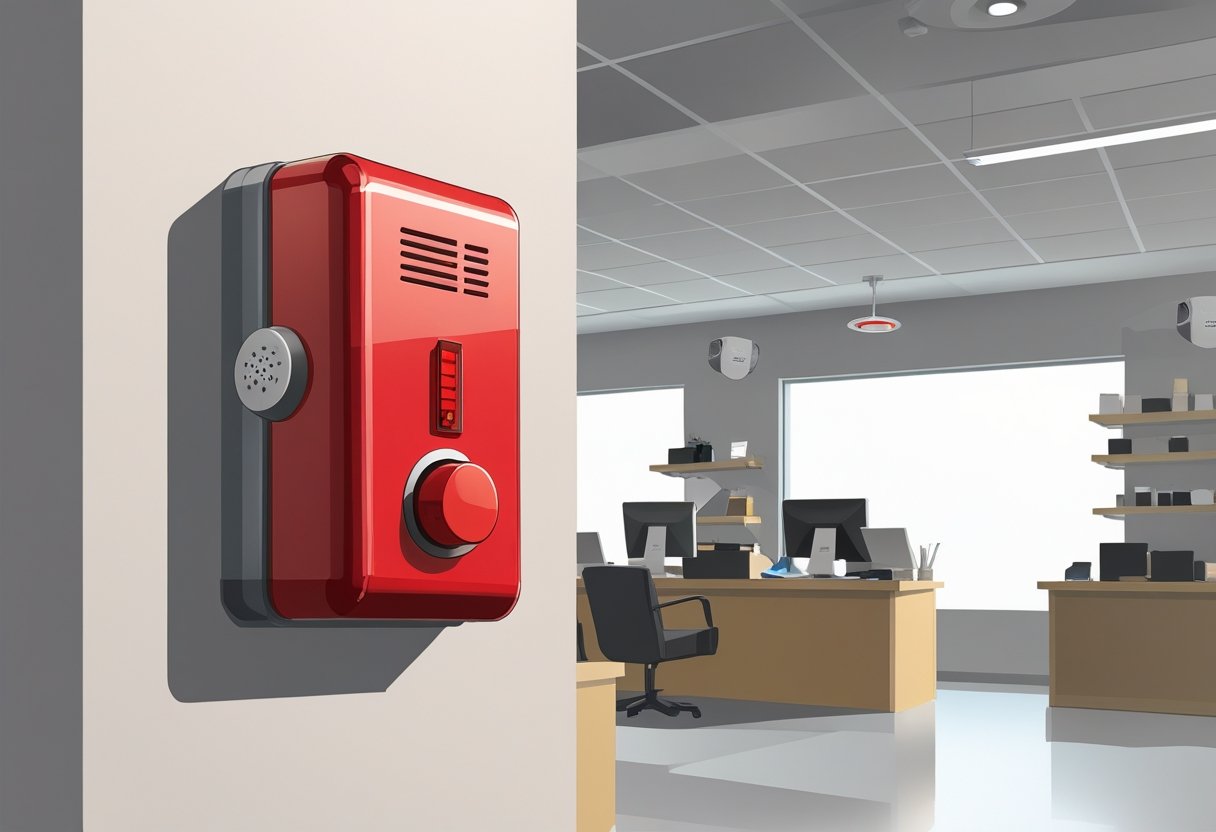As a small business owner, your top priority is ensuring the safety of your employees and customers. Installing a reliable fire alarm system is essential to protect your workplace from fire risks and meet local safety regulations. A well-designed fire alarm system not only alerts you to potential dangers but also helps safeguard your assets and gives peace of mind.
Understanding the different types of fire alarm systems available can help you make an informed decision tailored to your specific needs. Whether you are exploring options for a brand new setup or upgrading an existing system, knowing what features to look for can streamline the process. For businesses in the greater Houston area, having a fire alarm tailored to comply with local codes will enhance your safety measures.
Investing in the right fire alarm system will not only help you avoid costly penalties but also demonstrate your commitment to safety. With innovative technology continuously evolving, today's fire alarms offer smart integration and user-friendly features that make them essential for any business.
Essential Fire Alarm System Components for Small Businesses
For small businesses, investing in a reliable fire alarm system is crucial for safety. Understanding the essential components can help you make informed decisions that protect your employees and property.
Smoke Detectors vs. Smoke Alarms
Smoke detectors are specialized devices that sense smoke and provide an alert, while smoke alarms often contain a built-in alarm that sounds when smoke is detected. It’s important to choose the right type based on your business needs.
Ionization smoke detectors respond faster to flaming fires, making them suitable for areas with fast-burning materials. In contrast, photoelectric smoke detectors are more effective in detecting smoldering fires, offering a comprehensive approach to fire safety.
Installing a combination of both types enhances early detection. Regular testing and maintenance are crucial to ensure functionality.
Manual Pull Stations and Strobe Lights
Manual pull stations allow occupants to alert others of a fire emergency quickly. They should be easily accessible in key locations throughout your business, such as near exits.
Strobe lights provide visual alerts for those who may not hear an alarm. Including these in your system is essential, especially in noisy environments or for individuals with hearing impairments.
These components work together with your fire alarm system to ensure everyone in your establishment is alerted effectively, promoting a safer evacuation.
Fire Alarm Control Panels
The fire alarm control panel is the brain of your fire alarm system. It monitors the system's components and triggers alarms when smoke or heat is detected.
A reliable control panel should be user-friendly and capable of integrating with other safety systems, such as sprinklers or HVAC controls. Choose a model with features that fit the size and type of your business.
Regular inspections of the control panel are necessary to maintain its functionality and ensure it operates as intended in emergencies.
Heat Detectors and Supplemental Devices
Heat detectors play a vital role in fire alarm systems, especially in areas where smoke detectors may not be effective, such as kitchens or warehouses. They activate when they detect a significant rise in temperature.
In addition to heat detectors, consider incorporating supplemental devices like carbon monoxide detectors. These enhance your fire safety system by addressing different hazards.
Regular maintenance checks keep these devices in working order and ensure they can respond promptly when needed. Proper placement of each device maximizes the effectiveness of your fire alarm system.
Choosing the Right Fire Alarm System for Your Small Business
Selecting the right fire alarm system is crucial for safeguarding your small business. Understanding the various types of systems available and their specific features will help you make an informed decision tailored to your needs.
Types of Fire Alarm Systems
There are several types of fire alarm systems available for small businesses. The most common include conventional, addressable, and wireless systems.
- Conventional Systems: These are straightforward and cost-effective, best for smaller spaces. They can identify fire in zones but not pinpoint the exact location.
- Addressable Fire Alarm Systems: More sophisticated than conventional systems, these allow for precise identification of the alarm's location. This capability is beneficial for larger or more complex layouts.
- Wireless Systems: These systems offer flexibility and easy installation, eliminating the need for extensive wiring. This can be advantageous for businesses with changing layouts or that don’t want extensive disruption.
Addressable Fire Alarm Systems vs. Conventional
When considering fire alarm systems, you need to weigh the differences between addressable and conventional systems.
- Precision: Addressable systems can identify specific devices that have been activated, while conventional systems only indicate a general zone.
- Cost: Addressable systems are typically more expensive initially but may save money in the long run due to reduced false alarms and maintenance.
- Installation: Conventional systems are easier and faster to install, making them attractive for immediate needs. Addressable systems require more planning but offer greater functionality.
Choosing the right type depends on your business size, budget, and future growth plans.
Evaluating Detection and Notification Needs
Every small business has unique detection and notification needs based on its layout and industry.
- Building Size: Assess whether your space requires more or fewer sensors. Larger spaces often need more detectors.
- Occupancy: Consider how many people are usually present. Systems should include audible alarms and visual notifications for those with hearing impairments.
- Risk Areas: Identify high-risk zones, such as kitchens or storage areas. Ensure these areas have adequate coverage with smoke and heat detectors.
Choosing the right fire alarm system requires thorough evaluation of your specific needs and compliance with local regulations in the greater Houston area.
Fire Alarm Monitoring and Remote Management
Effective fire alarm monitoring and remote management are vital for protecting your small business. These systems provide continuous oversight, enabling quick responses to potential threats. Understanding the specific benefits, capabilities, and integration options can enhance your fire safety strategy.
Benefits of Alarm Monitoring
Alarm monitoring offers critical advantages to your business. Primarily, it ensures 24/7 surveillance of your fire alarm system. This constant vigilance means that any triggered alarms are promptly reported to monitoring centers.
Professional monitoring centers respond immediately when an alarm activates. They can alert emergency services, ensuring that help arrives as quickly as possible. This fast response can significantly reduce damage to your property.
Additionally, alarm monitoring can lead to lower insurance premiums. Insurance providers often reward businesses with robust safety measures. This potentially lowers your overall operating costs while protecting your assets.
Remote Monitoring Capabilities
Remote monitoring enhances the effectiveness of your fire alarm system. It allows you to access your alarm data from anywhere, giving you peace of mind even when you're away.
With remote management, you can receive real-time alerts on your mobile devices. This capability means you are always informed, allowing you to react swiftly to any issues.
Many modern systems also offer diagnostics. You can monitor the health of your fire alarm equipment and schedule maintenance proactively. This can prevent equipment failure and ensure your systems work when needed.
Integrating Alarm Monitoring with Other Systems
Integrating alarm monitoring with your existing security systems offers added layers of protection. By connecting fire alarms with intrusion detection and video surveillance systems, you can have a comprehensive safety network.
This integration ensures that all systems work together seamlessly. For instance, when a fire alarm is triggered, your security cameras can automatically start recording. This can provide valuable details during an emergency.
Furthermore, coordinated systems streamline reporting and monitoring. You can manage alarms and video feeds from a single interface. This centralization enhances your ability to respond to emergencies efficiently.
Regulatory Compliance and Industry Standards
Navigating regulatory compliance and industry standards for fire alarms is crucial for small businesses. Understanding the specific requirements helps ensure safety and legal adherence while protecting your assets and people.
Understanding NFPA 72 Compliance
NFPA 72, the National Fire Alarm and Signaling Code, outlines essential requirements for fire alarm systems. You must adhere to this code to ensure your fire protection system is reliable and effective.
Key aspects include proper installation, maintenance, and testing of alarm systems. Following these guidelines helps prevent malfunctions and contributes to the safety of your premises. Regular updates to the code mean staying informed about any changes is essential for compliance.
Meeting Local and National Fire Codes
In addition to NFPA 72, you must comply with local and national fire codes that apply to your specific location in the greater Houston area. These regulations address various elements, including alarms, sprinkler systems, and emergency exits.
Local codes may have stricter requirements than national standards. Therefore, consulting with local fire marshals or safety professionals ensures you meet all obligations. Non-compliance can lead to fines and legal issues, making it important to stay informed.
Inspection and Testing Requirements
Regular inspection and testing of your fire alarm system are key to maintaining compliance and ensuring functionality. NFPA 72 dictates that you should perform inspections at least annually, while some components may require more frequent checks.
Documenting all tests is essential for compliance validation. Training employees to recognize alarm signals and respond quickly further enhances safety. Regular drills ensure preparedness and understanding of emergency procedures, thereby minimizing risk.
Professional Installation, Support, and Maintenance for Small Businesses
When it comes to fire safety, small businesses need reliable solutions tailored to their unique needs. Professional installation, consistent support, and meticulous maintenance of your fire alarm system are crucial in ensuring safety and compliance in your workspace.
System Design and Customization
Your fire detection system should align perfectly with your business layout and specific requirements. This process begins with a detailed assessment of your building, including the number of floors, occupancy levels, and potential fire hazards.
Professionals will work with you to create a customized design. This includes selecting the right type of commercial fire alarm systems and strategically placing detectors and alarms for optimal coverage.
In Houston, specialized services ensure your fire alarm system not only meets regulatory standards but also addresses any unique challenges your business might face.
Certified Installation Processes
After you have a customized design, it’s time for installation. Certified technicians follow strict guidelines and industry practices to guarantee that your commercial fire alarm system is installed correctly.
This includes adhering to local code requirements and ensuring proper connections for all components of your fire detection system. Documentation is maintained throughout the process for future reference and inspections, establishing a reliable foundation for your fire safety measures.
Proper installation improves system effectiveness and response times, which can be critical during emergencies.
Ongoing Support and Maintenance
Once installed, ongoing support is vital to the longevity and reliability of your fire alarm system. Regular inspections and maintenance services help identify and rectify potential issues before they escalate.
Contracting with a local service provider in Houston ensures that you receive prompt support tailored to your specific system. Many companies offer service packages that include routine checks, documentation of maintenance records, and emergency response capabilities.
Scheduled maintenance minimizes the risk of malfunctions and maintains compliance with safety regulations. Your peace of mind is a priority, knowing that trained professionals monitor and support your fire detection system diligently.
Frequently Asked Questions
When considering fire alarm systems for your small business, you may have specific questions regarding costs, types, legal requirements, and integration with other security systems. This section addresses some of the most common inquiries to help you make informed decisions.
How much does a fire alarm system cost for a business?
The cost of a fire alarm system can vary significantly based on the size of your business, the complexity of the system, and the specific features you require. Generally, installation costs can range from $1,500 to $10,000. Be sure to get quotes from local providers for accurate estimates tailored to your needs.
What are the different types of commercial fire alarm systems available?
There are primarily three types of commercial fire alarm systems: conventional, addressable, and wireless. Conventional systems are best for smaller settings, while addressable systems offer more advanced features for larger businesses. Wireless systems are becoming more popular due to their easier installation and flexibility.
Are small businesses legally required to install fire alarms?
Yes, most small businesses are legally required to have functional fire alarm systems. Local regulations in the greater Houston area stipulate that these systems must meet specific code requirements. Check with your local fire department for compliance standards applicable to your business.
What are the best fire alarm systems for small businesses?
The best fire alarm system for your small business depends on your specific needs. Look for systems with reliable smoke detection, manual pull stations, and notification devices. Brands like Honeywell and Bosch offer products tailored to small business environments with user-friendly interfaces.
Can fire alarm systems for small businesses integrate with other security systems?
Yes, many fire alarm systems can integrate with other security solutions, such as intrusion alarms and surveillance cameras. This integration can enhance overall safety and streamline your monitoring efforts. A consultation with a local provider can help identify compatible systems.
How do wireless fire alarms compare to wired systems for small businesses?
Wireless fire alarms offer flexibility and easier installation, making them ideal for small businesses that may not want extensive wiring. They also allow for easier scalability if you plan to expand your operations. However, wired systems often provide more reliability in terms of connectivity. Consider your specific needs when deciding between the two options.
.svg)



.svg)


.svg)



